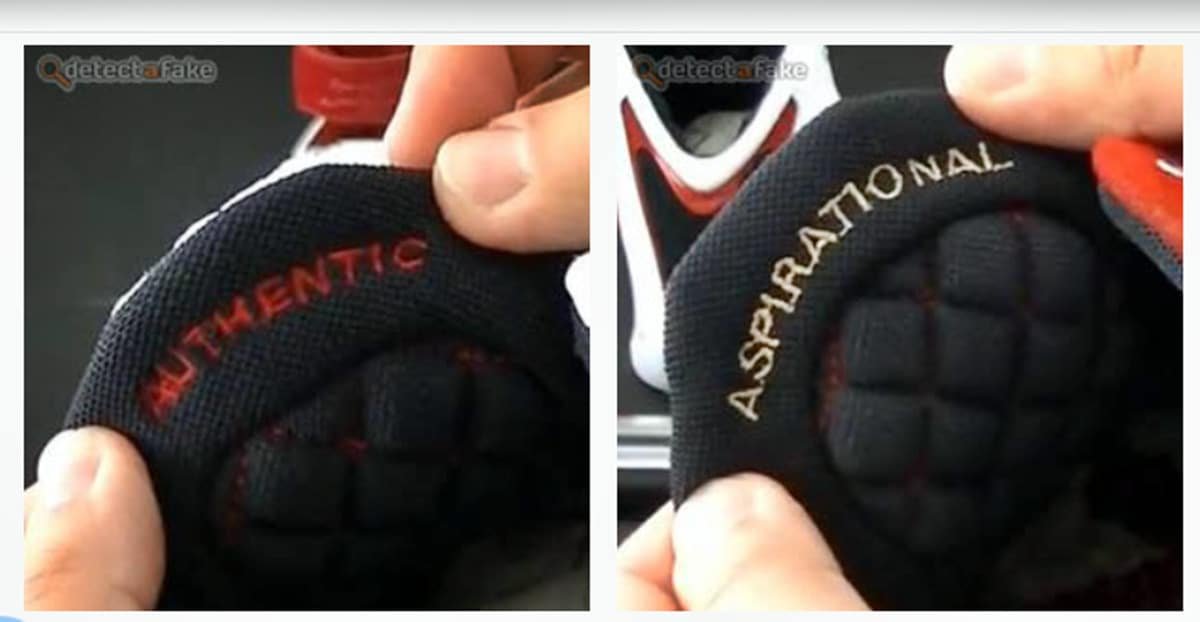How to detect fake Nike Air Jordan XXI (21) Retro
| Step | Checkpoint | Authentic Criteria | Fake Indicators |
|---|---|---|---|
| 1 | Manufacturing Details | Factory codes LN3 (China) or FT1 (Taiwan) on tag and box | Mismatch in factory codes and manufacturing country |
| 2 | Style Number | Box style number matches shoe tag style number | Style numbers on box and shoe tag don’t align |
| 3 | Jumpman’s Position | Centered on the heel bubble | Positioned at the bottom (fake) |
| 4 | Carbon Fiber Panel Texture | Textured feel on the real shoe | Solid, colored plastic on the fake |
| 5 | Lining Pattern | Quilted pattern lining | Deviation from the quilted pattern |
| 6 | Insole Examination | Interchangeable pod with 1 removable and 1 spare pod | Missing or extra pod, poor quality |
| 7 | Tongue Embroidery | Varied text based on colorway | Mismatched or incorrect text for the specific colorway |
| 8 | Lace Tips | Jumpman logo present on lace tips | Absence of Jumpman logo on lace tips |
| 9 | Black Light Test (Leather) | Message appears on leather circular panel | No message with black light on leather panel (fake) |
| 10 | Black Light Test (Suede) | Message appears on suede circular panel | No message with black light on suede panel (fake) |
| 11 | Insert Card Examination | Matching card with rounded corner and accurate details | Mismatched details, wrong corner rounding (fake) |
| 12 | Reverse Black Light Test | Jumpman appears on the authentic insert card | No Jumpman on the authentic insert card (fake) |
Real or Fake? Let’s Uncover the Truth!
When it comes to iconic footwear like Nike Air Jordan XXI (21) Retro, the market is unfortunately flooded with counterfeit versions. To ensure you’re rocking the real deal, follow these practical steps for a foolproof authenticity check.
Step 1: Manufacturing Details
Begin by checking the factory codes on the tag and box. Authentic pairs bear LN3 (China) or FT1 (Taiwan). Consistency is key; the manufacturing country on the box should match that on the tag.
Step 2: Style Number
Ensure the style number on the box aligns perfectly with the one on the shoe tag. Any discrepancy is a red flag for potential fakery.
Step 3: Jumpman’s Position
Examine the bottom of the shoe, focusing on the jumpman’s position on the heel bubble. In genuine pairs, the jumpman is centered, not at the bottom.
Step 4: Carbon Fiber Panel Texture
Authenticity can be felt in the details. Run your fingers over the carbon fiber panel on the shoe bottom – it should have a textured feel, not a smooth, plastic appearance.
Step 5: Lining Pattern
Check the lining of the shoe for a quilted pattern. Any deviation from this pattern may indicate a counterfeit product.
Step 6: Insole Examination
Peek inside the shoe and pull back the insole. Authentic pairs come with an interchangeable pod – one removable and one spare for different weights.
Step 7: Tongue Embroidery
Inspect the embroidery on the inside top of the tongue. The text should vary based on the colorway, so know the specific details for your pair.
Step 8: Lace Tips
Genuine Nike Air Jordans boast lace tips adorned with the iconic jumpman logo. Confirm its presence for a stamp of authenticity.
Step 9: Black Light Tests
For pairs with a leather circular panel, shine a black light to reveal a hidden message. No message? Potentially fake. The same applies to shoes with a suede circular panel.
Step 10: Insert Card Examination
New shoes should come with an insert card. Check for matching details, correct title alignment, and a rounded corner. Any deviation signals a potential fake.
Step 11: Reverse Black Light Test
Turn the insert card over and shine a black light. A genuine card will reveal the jumpman. If it doesn’t, your card might be a counterfeit.
Frequently Asked Questions
Q1: Can counterfeit shoes look identical to authentic ones?
Yes, counterfeit shoes can closely resemble authentic ones, making it crucial to scrutinize specific details for verification.
Q2: Why is the manufacturing country important in the authenticity check?
Authentic Nike Air Jordans are manufactured in specific countries, and discrepancies in the manufacturing details can indicate counterfeit products.
Q3: Are there fake Jordans with the jumpman logo?
Yes, counterfeit Jordans often replicate the jumpman logo, but careful examination will reveal differences in quality and positioning.
Q4: Can the lack of a black light test confirm fake Jordans?
While not foolproof, black light tests are a valuable tool. However, some counterfeits have improved their replication methods, so it’s essential to consider multiple factors.
Q5: Are fake insert cards common?
Yes, counterfeiters often replicate insert cards, but differences in details and the presence of the jumpman under a black light can help identify fakes.
Conclusion
To ensure you’re stepping out in authentic Nike Air Jordan XXI (21) Retro, follow these steps diligently. Counterfeiters are getting craftier, but with this guide, you’ll be one step ahead in the game of real vs. fake sneakers. Happy shoe hunting!















